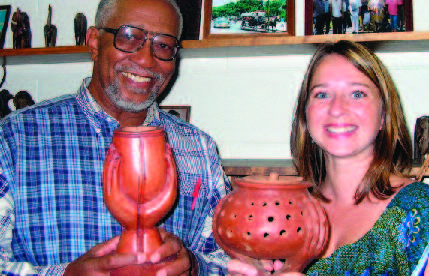Anthropology student completes African research project
"You're doing what?" That's what Marcy Hessling remembers her mother saying when she announced in 2001 that she was going to take a vacation and tour Africa by herself. Little did she know that the trip would change her life.
"The most enjoyable part of my trip was getting out and talking to people who lived in the places that I liked to visit as a tourist," she says. Her memories of the vacation became a calling for Hessling, who saw anthropology as a perfect career choice. "The trip was the thing that pushed me and said, 'This is important,' " she recalls.
Shortly after her return home to Waterford, Michigan, she quit her full-time job and transferred from a community college, where she was attending classes at night, to the undergraduate anthropology program at Wayne State.

In 2005, Hessling went back to Africa - this time as an undergraduate anthropology researcher. "I went to Benin, which is just west of Nigeria, to do a directed study of the effects of university education on urban migration," she says. She wanted to understand the challenges rural students face as they move away from family and their cohesive communities to enroll in big-city universities.
During the directed study, she spent much of her time at the University of Abomey-Calavi in the large city of Cotonou, Benin. "I did some participant observation, took some classes, and interviewed professors and students," she says. "The students I interviewed all had come from the rural area to go to school there. The professors gave me life histories as well as background on how the student body is changing."
Hessling's decision to take on a research project as an undergraduate student was partly influenced by her desire to continue her education in graduate school. "I was originally going to just breeze through my undergraduate classes and get them all done and out of the way, but I was looking at these graduate school applications and I had so many blanks: No, I have no presentations. No, I haven't done any research. I know none of those were required to get into grad school, but it would definitely help."
Fortunately, she not only was in a department that encouraged undergraduate research but also was able to find an excellent mentor in Professor Guerin Montilus, she says. "When I told him about my research idea, I didn't have a specific location in mind-just Africa-and then he told me that this [urban migration] is happening a lot in Benin. He's been going there since the '60s, and he said he saw what he called the aging of the villages, or basically the 'brain drain' of the villages." She says that college-educated individuals have little choice about where they live. "A lot of them want to go back home, but there are no jobs for them, so they can't."
Dr. Montilus, a cultural anthropologist, says he suggested Benin for Hessling's monthlong research project for several reasons. "Many places in West Africa are in turmoil, except Ghana, but Ghana is overstudied because they speak English. Benin has the advantage of being a peaceful country. It is a very interesting area." In addition, he has numerous trusted contacts in Benin whom he knew would welcome Hessling and ease the culture shock she might otherwise encounter.
In preparation for the May 2005 trip, Hessling spent eight months working with Dr. Montilus to assemble and refine her research protocol. During the same period, she sought and received grants for the directed study from four sources. Her success in obtaining grant funding is just one indication of how remarkable a student she is, Montilus says. "Graduate students usually have problems getting grants," he says with a laugh. "To get grants, students must know what they want, how to present their plan, and how to make it interesting to the donors. With Marcy, her plan was good and she had an interesting topic. She also writes well."
Before leaving for Benin, Hessling learned French, the official language of Benin. "All of the educated people know French, but the people in the villages for the most part speak a little bit of French but mainly speak Fongbe. I ended up with a guide for the month who was a native of Benin and spoke Fongbe, French, English, and a little bit of Twee, which is a language mostly spoken in Ghana. He was a great help."
Since she has returned from her directed study in Africa, Hessling has remained busy writing up and then presenting her findings at meetings in New York City, Knoxville, Detroit, Vancouver and Asheville. She also presented a brief summary at a recent meeting of the WSU Board of Governors. In addition, she is serving as the undergraduate representative for the National Association of Student Anthropologists, which is a section of the American Anthropological Association.
Now, her applications to graduate school are crowded with research accomplishments. "I've applied to grad school for the fall at Wayne State, Michigan, Michigan State, and Harvard," she says. One of the four has even nominated her for a five-year fellowship. "I don't think that would have happened at all without this undergraduate research," she says.
She strongly advises other students to consider doing research in their undergraduate years. "It seems sometimes that undergraduates might think that this is maybe too much for them - that it's not anything they can do as an undergraduate, and my thought is, 'You can do anything.' "
Montilus similarly endorses undergraduate research. "My experience tells me that this is the best way for undergraduate students to gain confidence in themselves." To make it as beneficial as possible, he stresses, faculty must take an active role. "For a young student, such as an undergraduate, it is very important that the teacher really be a leader and is focused, because the student comes to you with a dream and it has to become a reality.